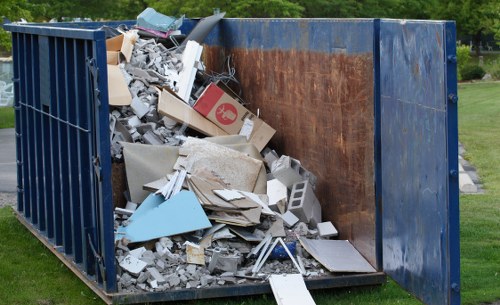Efficient Waste Disposal Solutions in Central London

Introduction to Waste Disposal in Central London
Waste disposal in Central London is a critical issue that affects the quality of life for residents and the environment alike. With the bustling population and constant influx of visitors, managing waste efficiently is essential to maintain the city's cleanliness and sustainability.
Central London generates a significant amount of waste daily, ranging from residential refuse to commercial and industrial waste. Proper disposal methods are vital to prevent pollution, reduce landfill use, and promote recycling and reuse.
In this article, we will explore the various waste disposal strategies employed in Central London, the challenges faced, and the innovative solutions being implemented to address them.

Types of Waste Managed in Central London
Residential Waste
Residential waste includes everyday household items such as food scraps, packaging materials, and unusable items. Proper management of this waste is crucial to reduce the environmental footprint of households.
Recycling: Central London highly promotes recycling among residents. Materials like paper, glass, metals, and plastics are collected separately to be processed and reused.
Composting: Organic waste from households is often composted, turning food scraps and garden waste into useful compost for urban gardens and green spaces.

Commercial and Industrial Waste
Businesses in Central London produce commercial and industrial waste, which includes office waste, construction debris, and manufacturing by-products.
Proper Disposal Practices: Businesses are required to follow strict guidelines for waste disposal, ensuring hazardous materials are handled safely and minimizing their environmental impact.
Innovative Solutions:
- Implementing waste reduction programs
- Adopting sustainable packaging
- Utilizing waste-to-energy technologies

Waste Collection Services
Municipal Services
The London Waste and Recycling Board (LWARB) oversees waste collection services in Central London, ensuring efficient and timely removal of waste from streets and public areas.
Scheduled Pick-ups:
- Regular garbage collection
- Recycling bin collection
- Bulk waste disposal
Importance of Timely Collection: Efficient waste collection prevents overflow, reduces health hazards, and maintains the city's aesthetic appeal.

Challenges in Waste Disposal
Population Density
Central London's high population density presents significant challenges in managing waste effectively. The sheer volume of waste requires robust infrastructure and logistics to handle disposal efficiently.
Space Constraints:
- Limited landfill space
- Restricted areas for recycling centers
- Urban planning complexities
Environmental Impact:
- Air and water pollution
- Greenhouse gas emissions
- Threats to local wildlife
Innovative Waste Disposal Solutions
Waste-to-Energy Plants
Central London is investing in waste-to-energy technologies that convert waste materials into usable energy, reducing the reliance on landfills and generating power for the city.
Benefits:
- Energy production from waste
- Reduction in landfill dependency
- Lower greenhouse gas emissions
Case Study: The recently established Thames Waste-to-Energy Plant processes millions of tons of waste annually, significantly contributing to London's energy needs.
Smart Waste Management Systems
Advancements in technology have led to the development of smart waste management systems that optimize collection routes, monitor waste levels in real-time, and enhance overall efficiency.
IoT Integration: Internet of Things (IoT) devices are used to track waste bin levels, ensuring timely collection and reducing unnecessary trips.
Data Analytics:
- Predictive maintenance for waste collection vehicles
- Optimizing collection schedules based on usage patterns
- Enhancing resource allocation
Recycling Initiatives
Community Recycling Programs
Community-driven recycling programs encourage residents to participate actively in waste reduction and recycling efforts.
Programs include:
- Neighborhood recycling competitions
- Educational workshops on recycling best practices
- Provision of accessible recycling bins
Impact: Increased recycling rates lead to reduced landfill use and promote a culture of sustainability within the community.
Extended Producer Responsibility (EPR)
EPR policies hold manufacturers accountable for the entire lifecycle of their products, including waste disposal and recycling.
Key Aspects:
- Designing products for easier recycling
- Implementing take-back schemes
- Funding recycling programs
Benefits: EPR encourages sustainable product design and reduces the burden on municipal waste management systems.
Public Awareness and Education
Campaigns and Workshops
Raising public awareness about the importance of proper waste disposal and recycling is essential for achieving long-term sustainability goals.
Initiatives include:
- Educational campaigns in schools and communities
- Workshops on waste segregation and recycling techniques
- Public seminars on the environmental impact of waste
Outcome: Educated communities are more likely to participate in recycling programs and adopt sustainable waste disposal practices.
Future of Waste Disposal in Central London
Sustainable Practices
The future of waste disposal in Central London lies in adopting sustainable practices that minimize environmental impact and promote resource efficiency.
Innovations to Watch:
- Advanced recycling technologies
- Circular economy models
- Zero-waste initiatives
Goal: To create a waste-free Central London where resources are continuously reused, and environmental preservation is prioritized.
Policy and Legislation
Government policies and legislation play a crucial role in shaping waste disposal practices and encouraging sustainable behavior among individuals and businesses.
Key Policies:
- Ban on single-use plastics
- Incentives for businesses adopting green practices
- Strict regulations on hazardous waste disposal
Impact: Effective policies drive systemic changes that support comprehensive waste management and environmental stewardship.
Conclusion
Waste disposal in Central London is a multifaceted challenge that requires coordinated efforts from government, businesses, and residents. By implementing innovative solutions, promoting recycling, and fostering public awareness, Central London can achieve a more sustainable and clean environment.
**Take Action Today!** Ensure you participate in local recycling programs and adopt sustainable waste disposal practices to contribute to a greener Central London.
Contact us today to learn more about effective waste disposal solutions and how you can make a difference!
